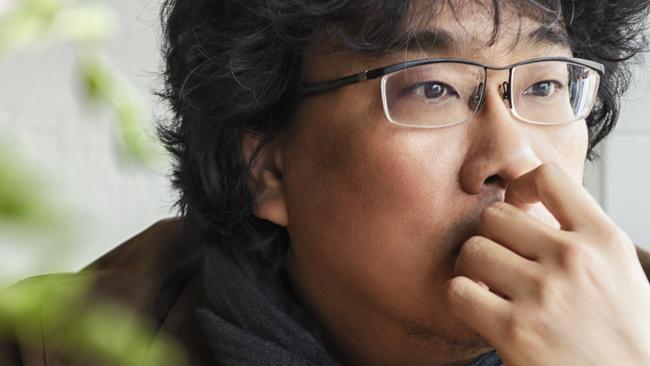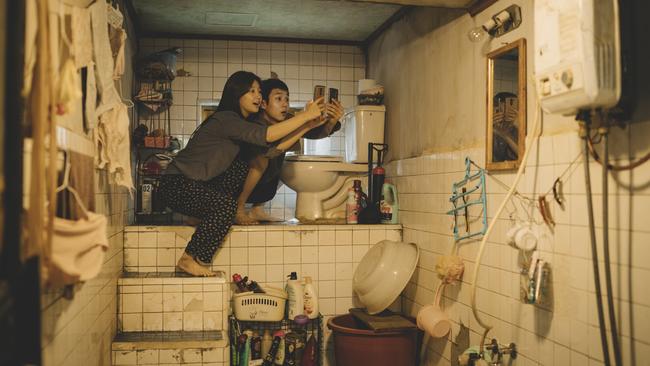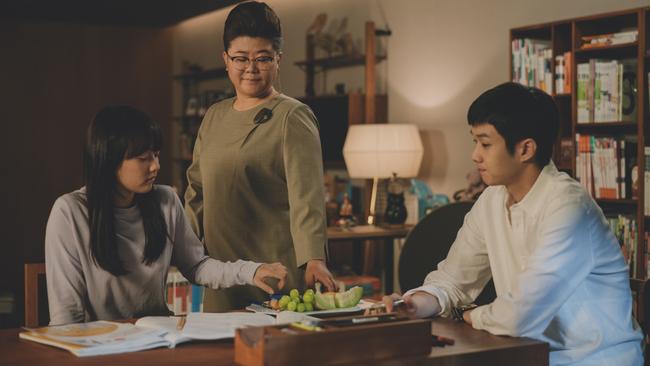Imperfect symmetry
In Parasite, award-winning filmmaker Bong Joon-ho has a movie of doubles and opposites, a ferocious portrait of rich and poor.

Bong Joon-ho’s Parasite is a blistering black comedy full of detail and devastation. It is the first Korean film to have won the Palme d’Or at Cannes, and it just took out the main prize at this year’s Sydney Film Festival. It’s an energetic, intricate work that began, the writer-director says, with the simplest of images: a piece of paper folded in half.
“You know, when you fold it down the middle, then open it up, and you put paint on the one half and you fold it again, and then when you unfold it, it’s exactly the same on both sides,” Bong says through an interpreter. The movie’s working title was Symmetrical Image, he says, and its origins are reflected throughout, in pattern, doubling, reflection and repetition.
Parasite focuses on two families of four — husband, wife, son and daughter — whose lives couldn’t be more different. The first family lives in a cramped couple of basement rooms in a building at the end of an alleyway, and their source of income is folding cardboard boxes for a pizza delivery company. The second family, the Parks, have a spacious, handsome, architect-designed home. The husband works in information technology; they have a housekeeper and a driver at their beck and call.

These families could have led entirely separate lives but they intersect by chance. The son of the first family, Ki-woo (Choi Woo-sik), is asked by a friend to act as a temporary tutor to the Parks’s teenage daughter. Ki-woo manages to pass himself off as a college boy from a good school, then realises there are jobs in the Park household for the rest of the family as long as they can present a plausible backstory and conceal their true identity.
There’s some inventiveness and ruthlessness involved in bringing the parents on board, but it all falls into place. For the moment, the resourceful Ki-woo and his family can’t believe their luck.
In an economic climate in which “500 graduates apply for a security guard position”, as father Ki-taek (Song Kang-ho) notes, they’re all in work.
Parasite chooses its targets carefully, however. Bong does not depict the wealthy, airily entitled Parks as out-and-out villains or bullies; what matters most of all is the nature of their circumstances and expectations. He talks about the way he uses space and location to convey difference, to emphasise class divisions, to convey the position of characters in the world.
In Parasite, there are two contrasting settings and outlooks, he says. “A wealthy house and a poor house. From the windows in the poor house, you see a dirty street; from the windows in the wealthy house, you see a lovely garden with lots of sunlight.”

Bong’s first feature, Barking Dogs Never Bite (2000), set in a large apartment complex, explored the way lives can impinge on each other, in a scenario in which the emphasis is vertical — the basement and the roof are sites of action. In his English-language debut, Snowpiercer (2013), a post-global warming ice-age action parable set on a perpetually moving train, the lines of power are horizontal. The wealthy and powerful occupy carriages close to the engine: the poor and dispossessed are held at the back of the train.
Yet the contrasts in Parasite are not simple or straightforward, and the plot is not about a reversal of fortune or a comeuppance. The story, we discover, involves more than just the two families: there are other characters and destinies embedded in the narrative and in the house itself, emerging unexpectedly and bringing disconcerting developments in their wake.
Bong has created a film of shadows, doubles and opposites, deliberate repetitions, comic juxtapositions and unsettling parallels. One character borrowing a line of dialogue from another tells us something about the former’s intentions. Two different forms of communication — mobile phones and morse code — have parts to play in what unfolds. And there are more brutal pairings as well, Bong says.

He talks about a scene in which the daughter of the first family indulges herself in a moment of luxury, taking a bubble bath in the Parks’s house. A few scenes later, she’s back home in the basement, sitting on the toilet, in a sequence that’s about to reveal how precarious her family’s circumstances really are. Bong has shot the scenes so that she’s in exactly the same physical position in both. It’s something the viewer may not notice yet is bound to be affected by. These echoes are everywhere, Bong says. “You can see other elements like that when you look into the film more closely.”
Those kinds of detail are there from the outset, he says. “When I write a screenplay all these images and sounds are already in my mind. So when the screenplay is done, I have drawings to give to the production designer and the cinematographer, to show them clearly what kind of image I wanted.”
Yet the genre mash-up — comedy, horror, drama, satire, slapstick — is not something he’s often aware of, he says. “When I write or shoot, I don’t even realise those things. What I focus on is that I want to make it real, as if it could happen in real life. And in post-production it’s when I realise, oh, that part looks a bit like horror.” It’s the same with tone, he says. He never makes a scene that’s intentionally funny. What he always focuses on is the reality of a scene: the comedy follows.
“But even when people laugh, it also makes them feel uncomfortable.”
And as always, in Bong, comedy is very close to tragedy. Talking about the nature of the master-servant relationship, he says, “In this story the wealthy and the poor are in close proximity, they can smell each other — this can be very brutal but also it creates comedy.”
Ki-taek overhears the Parks talking dismissively about the scent of poverty, the smell of “people who take the subway”, and his realisation that they define him in that way has terrible consequences. Audiences at screenings, Bong says, are always struck by this aspect of the movie, by its depiction of inescapable judgment and privilege. “People say to me, ‘I smell myself after the film.’ ”
Parasite is a ferocious portrait of inequality and its consequences, and many Cannes reviewers talked about the rage at the heart of the film. Yet Bong shies away from the idea of righteous anger.
“I had no intention to make it right or improve a devastating situation. I just wanted to talk about it very honestly. And it’s a situation in which it’s very difficult to find hope.” It was different from making Snowpiercer, he says. At the end of that film — a tale of exploitation, division and destruction — he felt able to give audiences a final image that offered some kind of optimism.
“It was possible there because it was science fiction. Parasite deals with a real situation. I thought it wouldn’t make sense to have an unrealistic hope. I wanted the movie to face reality more honestly.”
Parasite opens next Thursday.


